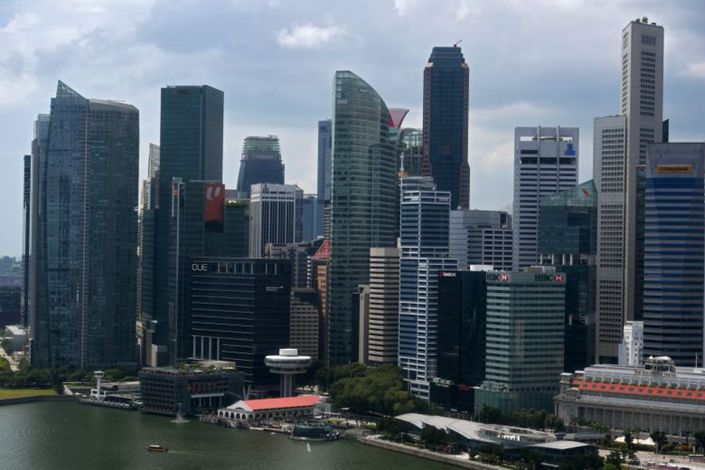Singapore Downgrades 2020 Growth Forecast on Coronavirus Impact

(The Straits Times) — The Ministry of Trade and Industry (MTI) on Monday downgraded its economic growth forecast to between -0.5% and 1.5% — indicating a possible recession — due to a weakened outlook after the outbreak of the coronavirus.
The MTI also said growth is expected to come in at around 0.5%, the midpoint of the forecast range. In November, the MTI forecast economic expansion of between 0.5% and 2.5% for 2020.
Gabriel Lim, permanent secretary for trade and industry, said that the last time Singapore suffered a recession was in 2001, when full year gross domestic product (GDP) contracted by about 1%.
However, he stressed that MTI’s baseline view at this point for 2020 is for GDP growth to come in at around 0.5%.
“As the Covid-19 situation is still evolving, there is a significant degree of uncertainty over the length and severity of the outbreak, and hence its overall impact,” Lim said at a media briefing on Monday.
He also noted that the economy shrank by 0.3% in the second quarter of 2003, amid the severe acute respiratory syndrome (SARS) outbreak. Growth bounced back to record a 5.3% expansion in the third quarter, ending full-year 2003 with a positive 4.5% growth, he said.
Edward Robinson, deputy managing director of the Monetary Authority of Singapore (MAS), said the central bank was prepared to recalibrate its monetary policy should the outlook of the economy change significantly as a result of the outbreak.
But he reiterated MAS comments on Feb. 5 that there is sufficient room within the current policy band to accommodate an easing of the Singapore dollar nominal effective exchange rate in line with the weakening of economic conditions.
On Friday, Prime Minister Lee Hsien Loong said the impact of the coronavirus outbreak on the economy has exceeded that of SARS, and that a recession was possible.
The MTI said its earlier forecasts made in November for growth in 2020 was premised on a modest pickup in global growth, along with a recovery in the global electronics cycle. “Since then, the outbreak of the coronavirus disease 2019 (Covid-19) has affected China, Singapore and many countries around the world,” it said.
“The outlook for the Singapore economy has weakened since the last review in November. In particular, the Covid-19 outbreak is expected to affect the Singapore economy through several channels,” the MTI said in a press release.
The ministry said that the economy grew by 0.7% in 2019, the same as its advance estimate and the slowest growth since 2009 when growth stood at just 0.1%.
Growth for the fourth quarter of last year came in at 1.0% year on year, higher than the initial estimate of 0.8% growth and faster than the 0.7% expansion in the third quarter.
On a quarter-on-quarter seasonally adjusted annualized basis, the economy expanded at a slower pace of 0.6% compared to the 2.2% growth in the preceding quarter, it said.
The ministry noted that the virus outbreak is likely to dampen the growth prospects of China and other countries this year.
Economic growth in China in 2020 is expected to come in lower than earlier projected due to a pullback in household consumption as a result of the lockdowns and travel restrictions implemented in several major Chinese cities to contain the spread of the virus, it added.
“Industrial production has also been disrupted because of work stoppages and delays arising from these containment measures,” the MTI said. “These developments in China will, in turn, have a knock-on impact on regional economies, including the Asean economies, through lower outbound tourism and other import demand from China, as well as disruptions to supply chains.”
There also could be sharper pullback in global consumption if the outbreak is more severe and protracted than expected.
Domestically, the virus outbreak may hurt the Singapore economy through several channels.
The outward-oriented sectors such as manufacturing and wholesale trade will be affected by the weaker growth outlook in several of Singapore’s key final demand markets, including China.
Companies in these sectors could also be affected by supply chain disruptions arising from prolonged factory closures and labour shortages in China.
The manufacturing sector has already suffered last year, shrinking by 1.4% year-on-year.
The ministry added that the outbreak has also led to a sharp fall in tourist arrivals, particularly from China, which has badly affected the tourism sector such as hotels, travel agents and cruise operators and the aviation industry.
The information and communications sector is also expected to be resilient on account of sustained enterprise demand for IT solutions, the MTI said.
But besides the virus outbreak, other uncertainties such as the trade war between the United States and China remain.
“Notwithstanding the phase one trade deal, US-China trade relations remain uncertain, especially as they turn to more contentious issues in the next phase of their negotiations,” the MTI said.
Geopolitical tensions in the Middle East could also affect financial and commodity markets, which will have negative spillover effects on the region and Singapore, it added.
The growth outlook for the U.S. and eurozone economies in 2020 remains broadly unchanged.
The MTI said: “As the Covid-19 (coronavirus) situation is still evolving, MTI will continue to monitor developments and their impact on the Singapore economy closely.”
This story was first published in The Straits Times.

- MOST POPULAR




